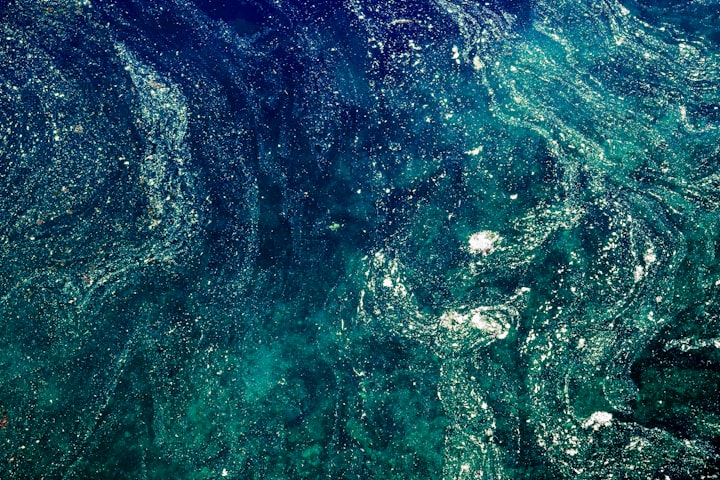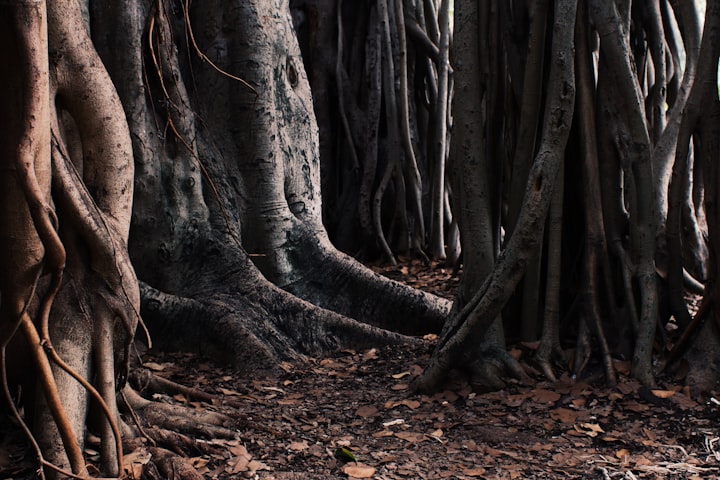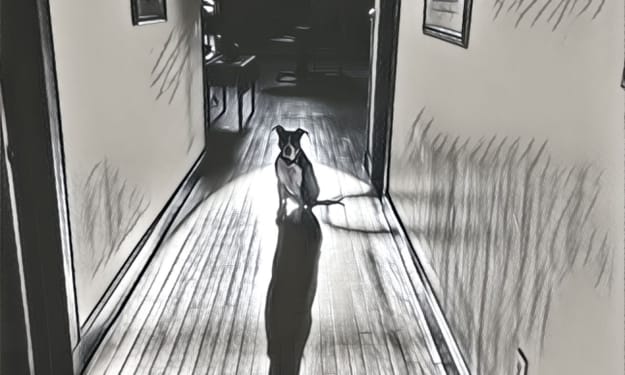
I can’t ever sleep on a drop, but Teddy can. He’s snoozing already, his company jacket wadded up between his head and the thick plane of glass that separates us from the dark sea. He’s managed to drift off with his name tag pressed against his cheekbone, and he snores softly as occasional bits of bioluminescence flicker past the window. His mom doesn’t like that he goes by Teddy, but it fits him so much better than his real name. I can’t imagine addressing that mess of curls and freckles as Theodore.
I turn away from the control panel and my sleeping coworker. Our little monitor is showing the Mariana Landing video in fizzing black and white, and I turn it up. Not loud enough to wake Teddy, of course. I want to make fun of him when we hit bottom, and he wakes to find ‘Theodore McAllen’ imprinted on the side of his face. It doesn’t matter, anyway. I’ve seen this vid so many times that I practically have it memorized.
It starts with JFK standing before a podium with a crowd of people and football bleachers rising behind him. He’s at some college in Texas, I think, but the actual name escapes my mind. JFK spends some time talking about the exponential increase in scientific discovery and the big discoveries that changed mankind. I zone out until I hear him talk about how the Deep Race will carry on with or without us. I think it’s what the speech is all about, that America is afraid of missing out if they don’t lead the bandwagon. It’s not my favorite part, though. That comes after all of the Nation with a capital’ N’ stuff.
“We choose to take to the depths,” JFK says from the screen, and it’s cheesy, I know, but I say the next bit out loud with him, “We choose to go to the depths in this decade and do the other things, not because they are easy, but because they are hard.”
What can I say? I like the deep sea.
The monitor plays the Mariana Landing next, and I watch as the first explorers of the Challenger Deep take fumbling, toddler steps in suits that rival the Michelin Man—not that ours are much better these days. I wonder, like I often do, what it must have been like to be the first. Were they frightened? Or were they so full of adrenaline and victory that they felt only excitement when their boots first hit the floor of the world? I’ve done these drops so many times now that I hardly remember what it felt like to be the little girl standing on a dirty beach, dreaming about reaching the deep. Maybe, by the time they completed all their schooling and training, those first deep-sea explorers felt much as I do now.
The video switches to the half about present-day deep-sea technology, and my eyes drift away. I’ve lost my patience for The Aequor Corporation’s self-congratulating spiel over the years of working for the corporation. Yeah, they’re responsible for thousands of jobs, but their benefits are horrible, and good luck getting any time off. If I didn’t get to drop down eight or nine thousand meters each month, I’d have left years ago. Well, I suppose that’s not exactly true. At the end of the day, it’s a job, and those are hot a commodity these days.
The video cuts off mid-way through a sentence about Aequor technology in the Mariana Trench, and we land softly on the seafloor of the Puerto Rico Trench, ten thousand miles east and about two thousand meters closer to the surface. I stand, and Teddy jostles awake with a gurgle. His curls are flat on one side, his features soft and confused with sleep. On one cheek are the letters—
“Odore McAllen!” Laughter spews from me like boiling seawater from a hydrothermal vent. “Odor! Teddy, I think you just got a new nickname.”
He looks at me like I’m an alien stepping into his world just to confuse him, so I turn and pull one of our suit helmets from a nearby locker. It’s spherical and white, but the face shield is mirrored so that when I hold it up to his face, he groans. “Damnit, Rosa.”
If anything, his long-suffering expression only makes my grin wider. “There is absolutely no possible way that could have been my fault.”
“You probably noticed it right away and let me sleep with my head on my name tag the entire trip!”
Well, yes. “I would never!”
He sighs, but I can tell he’s trying not to smile. “Just check the readings, will you? We’re supposed to be working.”
“Says the guy who spent the last four hours sleeping.”
I check the instruments anyway because he’s right. The pod herself is fine, and the temperature is normal. The pressure is astronomical, of course, because we’re almost nine thousand meters below sea level. There’s more activity than I’d like on our radar, but honestly, that’s to be expected too. We’re surrounded by a third of the world’s satellites—responsible for communication, internet, monitoring. You name it.
“Looks good. Grab your gear, Odor.” He groans again as he scoops up his helmet.
We step out just a short while later into one of the most bizarre environments our planet has to offer. It’s completely still—storms and ocean currents can’t get close— and darker than most people can comprehend. There are sounds— low, eerie groans that used to make the hairs on the back of my neck stand up. Anything living down here has to survive under nearly eight tons of pressure per inch, but a few things still do: little, translucent sea-cucumber relatives, shrimp-like amphipods, and frilly, single-celled xenophyophores that sound like something out of a sci-fi horror film but look like soft brain coral. In our pod’s lights, I can see a few slug-like bodies on the ocean floor, but most of the space there is coated with junk. There are older versions of satellites, tools, and pieces of the machines that got them down here among less recognizable trash. Above it all, the in-use equipment sits on fragile-looking stilt legs, a few years at most from joining the litter below.
“Se va a la mierda,” I say under my breath, and Teddy, who doesn’t speak a lick of Spanish, chuckles.
“Yeah, I know what you mean. The place looks worse every time we’re here.”
“No kidding. If they’d bother to get rid of some of the trash, then maybe they wouldn’t have to send us down here so often to fix the good stuff.”
“You know how it is. This junk is easy to get down here because it’s so bloody dense, it sinks. Imagine the amount of fuel it would cost to get it to the surface again.”
I chew my lip. “Way more than it takes to get our little pod up there.”
“Exactly.”
“I guess it’s a good thing the Aequor Corp’s a slob. If they ever change their mind and decide to clean up after themselves, we’d be out of a job.” Maybe it’s not the most altruistic statement, but anyone who’s ever scraped by knows how it is. You do what you’ve gotta do.
We make our way to the job site where an old Aequor satellite is leaning precariously against one of the shorter, newer ones. Of its three skinny legs, two are still completely functional despite the lack of blinking lights on the thing’s console. The third is the reason for the issue.
Teddy curses under his breath. “I don’t like the look of this at all. The only reason it hasn’t collapsed completely is because of the network satellite the bosses want us to fix, but if we do anything to move it, we’ll be in just as much danger of being crushed.”
“What if we go at the other legs? Make it lean away?”
“And get caught beneath it?”
“We don’t have to cut through them completely. Just enough to let gravity finish the work for us.” I can’t see Teddy’s face through his visor, but I know he doesn’t like the idea. He lost a partner to an accident down here in the depths a few years before I met him, and he wears the fear and grief of it like armor plating.
“Let’s see if we can’t figure out anything better,” he says, and we waste some time looking, but it’s clear after a while that it’ll either be my idea or going up empty-handed, and there’s no way I’m going to fail an assignment.
We end up each poised before a leg with wire saws adapted by Aequor for deep-sea work. I give the count. “Three, two, one.” Teddy’s saw starts buzzing a fraction of a second before mine, but I’m pretty certain we put them to the metal together. It doesn’t sound anything like sawing in air. Water is thicker, so it’s low and drawn out, and all the pressure just bends what ought to be a high-pitched whine even deeper. It cuts just fine, though. Like a circular saw through soft pine until my tool abruptly turns off halfway through the cut.
“Mierda.” I try to pull it out, but the wire’s stuck. It doesn’t want to budge. Ten feet away, Teddy’s clicked his off too.
“You okay?”
“Yeah, this thing’s just a piece of junk. Gimme a second.”
I click the power button off, on, off, back on again. No go. I can wiggle the wire a little, but it still catches if I try to bring it back out. On impulse, I shove it in the opposite direction, towards the still uncut portion of the leg, and, after a moment, the thing sputters back to life. I’ve still got all the muscle I can muster behind it, so in that single jagged second, the thing slices clean through and goes out the other side.
At first, nothing happens. There’s a low groan from the entire structure, and the bottom piece—the part I’ve cut off— shifts.
“Rosa, move!”
I backpedal, boot thrusters flaring to life just as the whole thing starts to come down. It’s moving in slow motion, but so am I, and I know— I just know I’m going to be crushed. Then, Teddy’s gloved hand closes around the back of my suit and swings us both out of the way. The whole world is silt, grey-yellow in the light of our pod, and thicker than any fog that’s ever touched land. It’s like being in a sandstorm, only nine thousand meters beneath the ocean’s surface, separated from enough pressure to kill you instantaneously by a suit that’s only a few degrees removed from the marshmallowy contraptions the first deep-sea explorers wore.
Teddy grips my shoulder, and I grip his arm, and we float there together, shaking until things start to settle. “Thanks, Odor,” I manage, because this close to tears, the only decent answer is humor.
Teddy laughs a little. “If you ever do anything like that again, I swear to God I’ll resurrect you just to kill you all over again.”
“Never again,” I promise, and then it’s back to work even if visibility is too low to be entirely sure of anything you’re doing. I’m almost grateful for it. I don’t want to see the splattered bodies of the sea-cucumber-like holothurians that had been huddled below the crash.
Somehow, we get the satellite fixed and head back to the pod to take off again. The whole day weighs on me— the over-flowing trash-bin of a trench floor, the near-death experience, the way Teddy’s still shaking in his seat next to me. JFK’s speech starts up again behind me because it’s the only vid this stupid company pod has. I don’t turn to face it, but I can hear him get going on the greatness of human scientific discovery, the might of the American nation. I wonder what he would say if he’d seen the Puerto Rico Trench today. Se va a la mierda.
I’ll be back down there the next time they’ve got an assignment for me. You do what you’ve gotta do.
About the Creator
Liv Savell
Liv is a 4x self-published author, musician, and hiking enthusiast She can often be found with her animals or curled up with a good book. Learn more about her books and other works at lsfables.com.





Comments
There are no comments for this story
Be the first to respond and start the conversation.